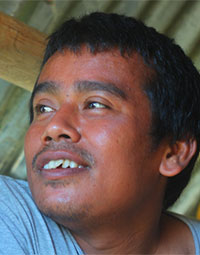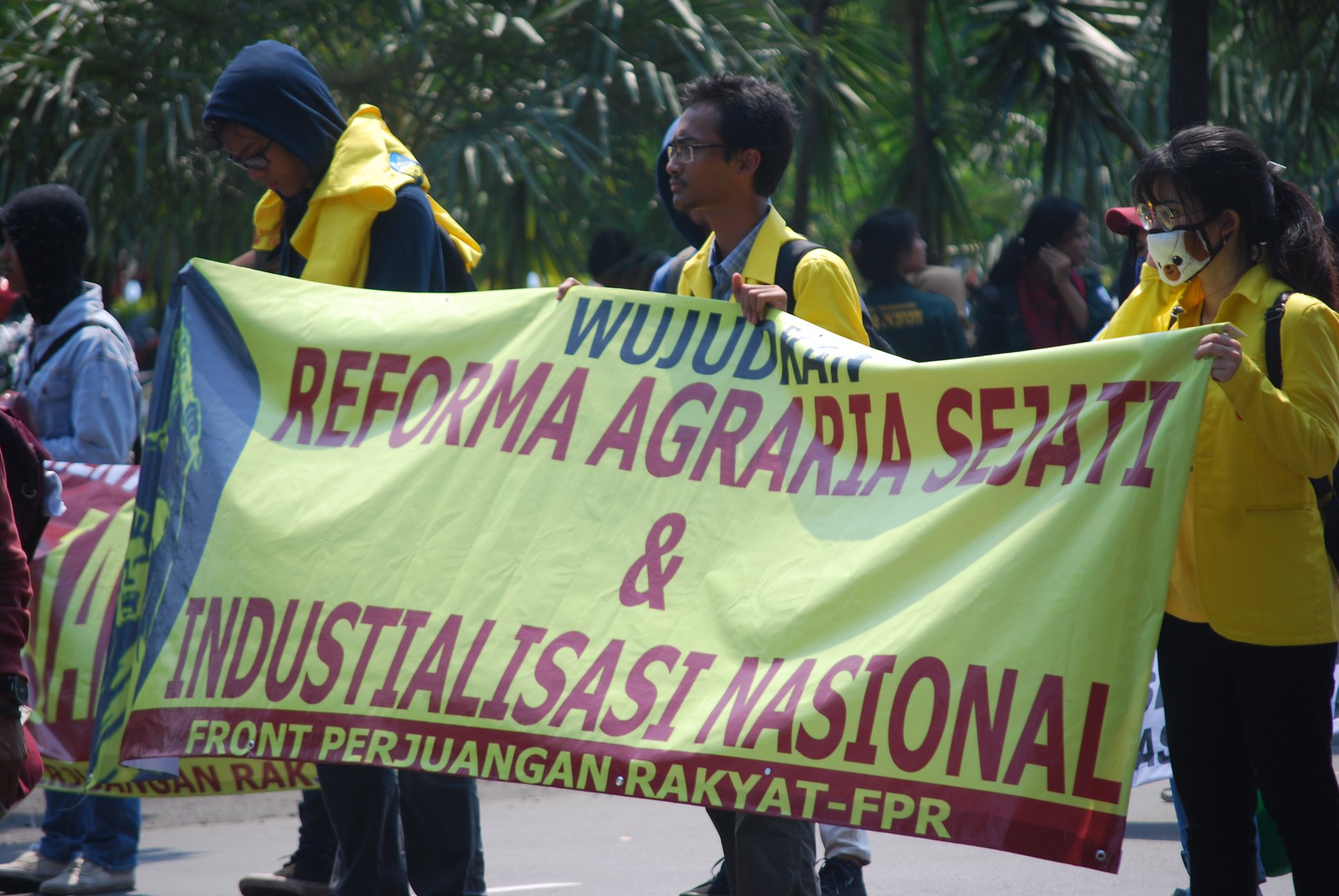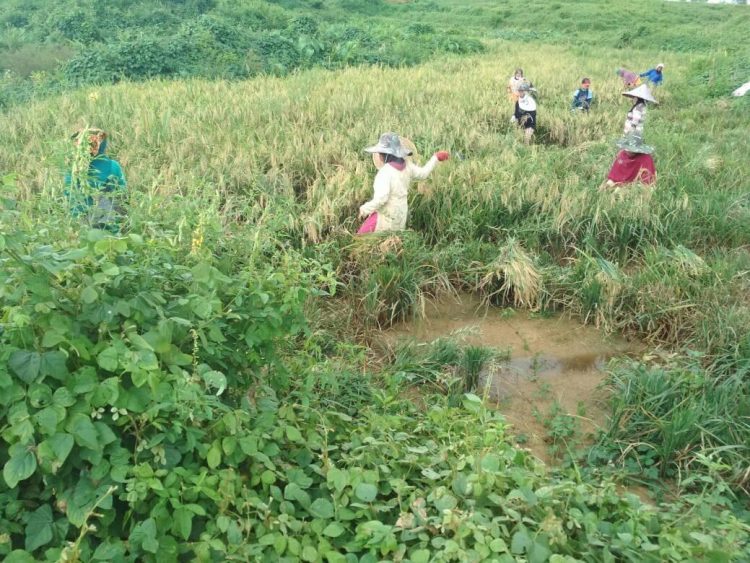 Food And Rights Talk is a series of interviews with PAN Asia Pacific (PANAP) partners across the globe to find out the situation of rural peoples, in relation to food security and human rights, amid the COVID-19 pandemic.
Food And Rights Talk is a series of interviews with PAN Asia Pacific (PANAP) partners across the globe to find out the situation of rural peoples, in relation to food security and human rights, amid the COVID-19 pandemic.
This week, we talk with Rahmat Ajiguna, secretary general of the Aliansi Gerakan Reforma Agraria (AGRA) an alliance of peasant movements working on land reform and other agrarian issues in Indonesia.
PAN Asia Pacific (PANAP): What is the extent of the COVID-19 pandemic in Indonesia? Latest reports indicate that COVID-19 cases are rising. Rahmat: It is clearly shown by government data that day by day, the cases of COVID-19 are rising, including deaths and people suspected to have the disease. The efforts of the government at handling the pandemic is not really effective because there is an increasing number of victims. This is because the Indonesian government just follows and depends on imperialist or developed countries in the way they handle the pandemic, with no relevant and adequate resources to overcome it based on the needs and culture of Indonesians. Therefore, the efforts are only focused on restrictions to limit the activity of people. They call it big-scale social distancing or PSBB, but the effect is more of territorial quarantine. But the government ignores its responsibility to address the health and medical aspect of COVID-19. It does not sufficiently fulfill the needs of the people in this regard. They don’t provide food and good nutrition for the people to increase their immunity during the pandemic. They don’t provide medical tests or mass access to health care, which can halt the rise of this pandemic. That is why there are some areas in the red zone where people are sick and hungry.
PANAP: Does the government implement mass testing for COVID-19?
Rahmat: So far, the government does not really provide mass testing. They just say that we need such testing but our capacity is far behind our neighbours. Right now, they don’t provide facilities for people to get a comprehensive medical test, that’s why the people really rely on their own efforts to check their health situation. The government has efforts to implement mass testing, they designated certain hospitals in province and cities to facilitate testing for COVID-19. But it’s still in the scheme of health as business. It’s very expensive for people to have themselves checked. The prices vary based on the hospitals. Each test costs from 300,000 IDR (20 USD) to 700,000 IDR (47 USD). Especially for poor families, that is very expensive. That’s why there’s a limited number of people who can access these tests. (The Indonesian government is offering free testing only for people who have been in contact with positive cases or who have visited high-risk areas and present with COVID-19 symptoms.–Ed.)
This situation increases the uncertainty and anxiety of the people. People don’t know how long they have to wait for conditions to get better, while at the same time, the government does not provide a comprehensive scheme for handling COVID-19, especially in the medical and health care aspect. It predicts that the situation will continue until 2021, and tells us that we need to be patient, that we need to wait. But they are not making an effort to halt the rise of this pandemic in a way that assures people.
PANAP: What are the most significant impacts that COVID-19 pandemic on the lives of Indonesian farmers?
Rahmat: Conditions in Indonesian rural areas have worsened. Agricultural production of peasants is decreasing while the burden of life rapidly increases. It puts Indonesian peasants under a lot of stress. During the pandemic, the buying price of agricultural commodities such as rubber, palm oil, vegetables, and other farming produce are decreasing. So farmers do not have sufficient income. At the same time, farmers need to shoulder the daily costs of living, which have become more burdensome. During the pandemic, the prices of food and other daily needs are increasing. Even families’ costs for education are increasing.
In the rural areas, there is increasing unemployment—they cannot go to another city or province for work because of movement restrictions. Aside from farming, people can’t have other jobs. But families need to pay off their loansand land rent amid tightening usury. Since farmers don’t have sufficient income, they have to take on new loans to fulfill their daily needs, and at the same time, they have to pay off their previous loans. So debts are actually increasing. We can just imagine how difficult the life of a farmer is at this time.
PANAP: Are farmers allowed to go to their fields to farm?
Rahmat: Yes, because Indonesia relies on the export of agricultural commodities while at the same time depends on the import of food commodities for domestic consumption. So people are still allowed to farm, but the government relies on the import of agricultural commodities. We see that farmers are still tilling their fields, but under uncertain conditions for their products, whose buying prices are decreasing because there is no protection from the government—no assistance if they fail in their farming, no provisions for them to directly distribute their products. Meanwhile, we see the government providing assistance to corporations, to ensure that their production and their income continues. But for farmer families, there is no assistance.
PANAP: What kind of assistance is the government giving to corporations vis-a-vis the assistance it gives to farmers?
Rahmat: There are no subsidies for agricultural production and consumption, staple food, and other basic needs of the farmers. The government does provide assistance through the social aid program, but it’s very insufficient. It is mostly focused on urban areas and the number of families that can access it is very small. For rural families, access is even more limited, and the amount of the money given is very small—just enough for us to survive for a while, but can’t provide for our other daily needs. It is very different if we compare it to the assistance they give to corporations. For example, the government allowed corporations to temporarily suspend work without giving their workers any assistance. In fact, they can unilaterally lay off their workers without any penalties. They are also allowed to pay just half of workers’ wages during the pandemic. The government also provides incentives to corporations in order for them to avoid bankruptcy. But they don’t provide social and health protection for workers. So many workers are forced to work without sufficient protection. Corporations continue to make profits, at the expense of workers. It’s a huge injustice.
PANAP: You mentioned that food prices are increasing. Why is this so?
Rahmat: This is because the government just relies on speculation about the amount of food needed by the people. They don’t have exact calculations on how to fulfill our needs under the pandemic. During the pandemic, the government implements more restrictions to and from the rural areas and the cities. This situation is used by traders and speculators to increase food prices. They say that the supply is difficult, it costs more to transport and distribute food, and they need longer time to deliver food. It is also true that access to transportation is limited, even public transport, so that transportation providers have all increased their costs, which is another factor in the increase of food prices. Furthermore, the people are being pushed to rely on online platforms for buying and selling food commodities. Food prices in online platforms are higher. At the same time, consumers need to shoulder additional costs—for internet connection, for higher electricity consumption, even the smartphone itself. Finally, the government does not provide good prices for the products of local farmers and just rely on imported food. They need to wait for these imported products, and usually, the prices are higher.
PANAP: Has your government adopted measures to ensure food security amid the pandemic?
Rahmat: Even before COVID-19, the government already has policies for food security. But what they mean by food security is to rely on imported food products. The export and import of food commodities are clearly not favoring the people, but are instead serving the interests of imperialists, land lords, and capitalist bureaucrats. The government just ensures the supply of particular products, but does not work on how we can have sufficient food and nutrition based on our domestic production. Our farmers can produce their own rice, maize, etc. but the government does not really see this as part of their food security policies. They are just focused on importation to ensure food supply in Indonesia. During the pandemic, the government is continuing this policy by increasing food imports, but they do not consider the purchasing power of the people, whether they can actually afford food or not. Meanwhile, to ensure the supply for exports of agricultural commodities, the government assigned the police and military to secure the agricultural production of corporations, guard the shed of Logistic Agency (Bulog), and forced the peasants to sell their products with unfair price.
PANAP: Are there human rights violations in relation to the government’s response to COVID-19?
Rahmat: There are so many types of human rights violations in relation to the government’s handling of the pandemic. Political expression, assembly, and mass protests, even raising certain demands to help us cope with COVID-19 are prohibited. Anyone engaging in protests can be arrested and be penalized. There are even instructions from the government and police that if there is a mass protest, and people do not obey social distancing regulations, they can be shot on the spot. The reality todayis that dozens of Indonesians are getting intimidated and even arrested. The government also restricts what is being said online or in social media, especially criticisms. They have formed a cyber task force to monitor all online information. If anyone posts about demands that violates regulations, they arrest them as well as the people who distribute these posts online. The government also implements restrictions for cultural and religious ceremonies. This Eid Mubarak, the government prohibited the people to go back to their villages as is the tradition. So the people’s social and cultural rights are not protected.

PANAP: How does AGRA help farmers in coping with these impacts, and in asserting their demands?
Rahmat: We call on our members to be really careful about their health condition, and make them aware of COVID-19 by providing sufficient information. But while we call their attention to the dangers of COVID-19, we tell them that they really need to keep their unity and solidarity, and continue with food production. We are relying on their farming efforts during this pandemic. We are encouraging them to rise up and assert their political demands, and really fight against these unjust conditions and policies imposed by the government and imperialists. We need to have to a strong voice and greater effort during this pandemic because there is a lot of injustice.
PANAP: Do you think the pandemic is an opportunity for the peasant movement in Indonesia to grow stronger?
Rahmat: Yes, the pandemic in our opinion clearly shows the crisis of imperialism, how it has failed to protect and ensure the lives of the people. People are doubly exploited, while corporations get to secure their profits. It is a good time for the peasant movement to show strong unity and to fight back. Especially now we can see that the people’s trust in the government and the economic system has really plummeted. People don’t trust the system anymore, so we as a people’s movement must show the alternative.
We also need to push and encourage the solidarity of oppressed and exploited people at the regional and global levels. This pandemic has shown that the global system has totally failed the peoples of the world. We need to fight imperialism as the root cause of this pandemic and the suffering of the people. The pandemic must be an opportunity for the unity of the oppressed and exploited classes to become stronger. ###








Discussion about this post